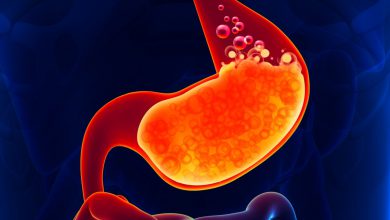Effects Of Alcohol On The Body

The damaging effects that alcohol causes on the body are numerous and diverse. Especially because of ethanol, which is a psychoactive drug that causes side effects and greatly alters the body. In this case, the amount of alcohol ingested, as well as the circumstances, play a very important role.
Discover in this article what are the effects of alcohol on our body.
How does alcohol work in the body?
Alcohol can have a double effect on the body, since in its beginning it produces a great feeling of satisfaction and joy . However, later on, blurred vision and severe coordination problems develop.
Cell membranes cannot stop the passage of alcohol. Therefore, when it is already in the blood, it is distributed by most of the tissues that make up the body.
With excessive consumption, consciousness is easily lost. But if consumption is too high, it can cause alcohol poisoning and even death.
Alcohol can be deadly
In fact, a high percentage of alcohol in the blood could even cause cardiorespiratory arrest. Death can also occur from asphyxia caused by vomiting. This would happen when a person is insane because of alcohol. At that time, you may choke on your own vomit because you cannot respond to this need.
Alcohol, after being ingested, can take thirty to ninety minutes to reach the blood. At that time, the sugars found in the blood are reduced.
This causes absolute weakness and exhaustion. The cause of this fatigue is because alcohol accelerates the transformation of glycogen into glucose, and this is eliminated faster.

The phases of alcohol poisoning
After drinking alcohol, the effects appear. These depend on the amount that has been ingested.
- The first is euphoria, excitement, disinhibition and impulsive behavior is acquired.
- The second is intoxication. When the body is not used to alcohol, it affects the nervous system. The ability to coordinate movements and balance is lost. This can cause some falls, as well as depression and loss of heat from the body.
- The third is the hypnotic phase, of much confusion. Irritability, agitation, sleepiness, nausea, vomiting, and headache occur.
- The fourth phase is anesthetic and stupor. Incoherent words are spoken, consciousness decreases, muscular strength is lost. At the same time, the urge to urinate is not controlled and breathing becomes difficult.
- The fifth phase is the bulbar or death phase. It goes into shock cardiovascular, respiratory arrest occurs and reaches death.
The effects of alcohol consumption on the body
The brain and nervous system
- Frequent alcohol consumption affects brain functions. First of all to emotions, by causing sudden mood swings. Motor control is impaired, with poor pronunciation, very slow reactions and loss of balance.
- It can alter the action of neurotransmitters, by modifying their structure and function. This produces a number of effects, such as slower reaction ability, delayed reflexes. The ability to coordinate movements is also lost, tremors and hallucinations occur. Finally, self-control is lost, memory, the ability to concentrate, and motor functions are altered.
- Alcohol causes serious damage to brain cells, as well as peripheral nerves, these damages can be permanent.
- In very high doses it can reach a coma, in very advanced cases it causes very serious mental disorders and permanent brain damage.
Other nervous disorders and their consequences
- Alcohol also causes a decrease in vitamin B1, which causes Wernicke-Korsakoff disease. This pathology causes the alteration of feelings, thoughts and memory.
- It produces sleep disorders in the vast majority of people who consume alcohol very frequently.
- In addition, these people often isolate themselves from their work and family social environment. This causes abandonment of families, divorces, and loss of employment. They can also suffer from deep depression and, in most cases, end in suicide.
- There are periods of anemia, with alterations in memory, a condition that can last a few minutes, hours or even a few days.
- All these effects together are also the cause of a large number of work and traffic accidents. In addition, these have ended the lives of a considerable number of people around the world.
In the heart and respiratory system
- Increases heart activity.
- Consuming very high doses can increase blood pressure or blood pressure. This causes damage to the heart muscle due to the toxic effect of alcohol.
- The heart muscle is weakened and therefore the ability to pump is diminished.
- It produces peripheral vasodilation, which causes redness of the skin and an increase in surface temperature.

In the digestive system
All gastric discomfort is due to ethanol eroding and irritating the gastric mucosa. This causes heartburn, which can be increased by drinking different kinds of liquors at the same time.
- Alcohol increases gastric acid production. This causes irritation and inflammation in the stomach lining. And, as a consequence, ulcers and internal bleeding that can be fatal.
- It can cause cancer of the stomach, larynx, esophagus, and pancreas.
- It can cause esophagitis, that is, inflammation of the esophagus, as well as bleeding esophageal varices.
- Acute pancreatitis occurs , which is severe inflammation of the pancreas. This can lead to death. Pancreatitis can also be chronic and cause intense permanent pain.
- The consumption of alcohol can lead the person to suffer from type 2 diabetes with the serious consequences that this disease causes in people who suffer from it.
- Alcohol provides a large number of calories with very little nutritional value. It prevents the absorption of some minerals and vitamins, suppresses the appetite and causes malnutrition.
Liver damage
- The organ that is responsible for metabolizing alcohol is the liver. Liver enzymes transform alcohol first into acetaldehyde and then into acetate and other compounds. The process is very slow, causing damage to liver tissues.
- Due to the irritation and inflammation of the liver cells, alcoholic hepatitis is likely to develop. In this way the liver can first transform into fatty liver. Then it can lead to hepatitis, and later to cirrhosis. Ultimately, it can lead to liver cancer and death.
- Other alterations of this organ can be jaundice, that is, the yellow color of the skin, the sclera and the accumulation of fluids in the extremities.
In the blood and immune system
- It prevents the production of white and red blood cells.
- When there are not enough red blood cells to carry oxygen , magaloblastic anemia occurs.
- The lack of white blood cells causes the failure of the immune system. This increases the risk of acquiring bacterial and viral infections.
In the reproductive system, pregnancy and the fetus
- Decreases sexual desire.
- It can cause infertility and erectile dysfunction.
- During pregnancy it can cause fetal alcohol syndrome in the fetus. The symptoms of this condition are manifested in growth retardation, alteration in craniofacial features, cardiac, liver, kidney and eye malformations.
- The most serious damage occurs in the central nervous system of the fetus. It can cause marked mental retardation.
Alcohol dependence syndrome or alcoholism

This is one of the most serious problems associated with the unbridled and uncontrollable consumption of alcohol. They are a large number of symptoms and pathologies that are associated with alcoholism.
First of all, we must seek professional help. Alcoholism is more than a vice, as it is named by many. Rather, it is a serious health problem that should be given immediate attention as soon as the urge to drink frequently begins.
If you have a friend, relative or acquaintance who has this problem, try to get them to let you help. You should go to a rehab center for alcoholics.
Later on he will thank you, because in this way he will be saved countless problems, both family and personal. And, most importantly, it will avoid serious health problems that carry often fatal consequences.
To sum up…
Excessive alcohol consumption has a negative impact on well-being. Not only does it lead to an addiction that is very difficult to treat, but it also affects a wide variety of chronic diseases that reduce the quality of life.
Specifically, it affects the nervous, cardiovascular, metabolic, immune and reproductive system functions. In addition, it causes serious emotional outbursts, such as depression and suicidal thoughts. Therefore, it is important to avoid its consumption and, if necessary, seek help to stop taking it.









